That's a Wrap! Tulane Concludes Inaugural Public Health Film Festival of New Orleans
Producers of the Public Health Film Festival of New Orleans, from left to right: Graham Patterson, Dee Boiling, Dr. Aracho Castro, Julie Holman, David Roston, Dean Thomas LaVeist, and Tara Brown.
F-NO, The Public Health Film Festival of New Orleans, debuted this May with a collection of powerful feature-length and short films. Despite some unforeseen circumstances with a heavy rainfall early Sunday morning, a collection of ten films were shown from May 10 to 12.
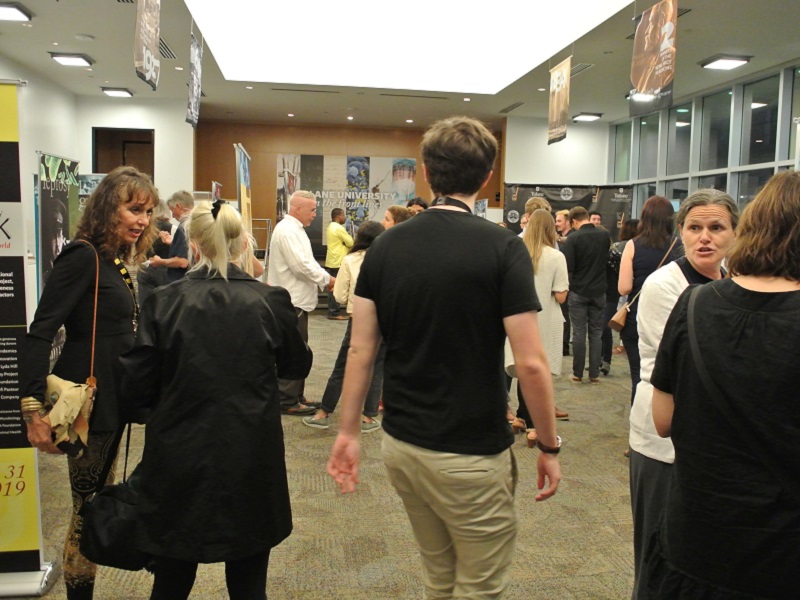
Visitors wait in Diboll Gallery before the start of the next documentary, Bending the Arc, at the Public Health Film Festival.
The festival included moderated panels with filmmakers and experts in the field. F-NO highlighted topics that ranged from gun violence to reproductive rights, veterans' health to HIV/AIDS, and beyond. Guests were also given additional resources where they could find or provide assistance for the wide range of public health topics the films covered.
F-NO was a collaboration between the Tulane University School of Public Health and Tropical Medicine and 102.3 FM WHIV. The aim of the festival was to foster discussions on a variety of health issues while honoring filmmakers who advocate for much-needed change.
One of the highlights of the festival included a screening of Period. End of Sentence on Friday night. The documentary short covers the taboo topic of menstruation in rural India and follows a group of Indian women as they learn how to operate a machine to create low-cost, biodegradable sanitary pads, which they sell to other women at affordable prices. The film was co-produced by Avery Siegel, a Tulane University undergraduate student majoring in communications with a minor in public health. The film won the Academy Award for Best Documentary Short this year.
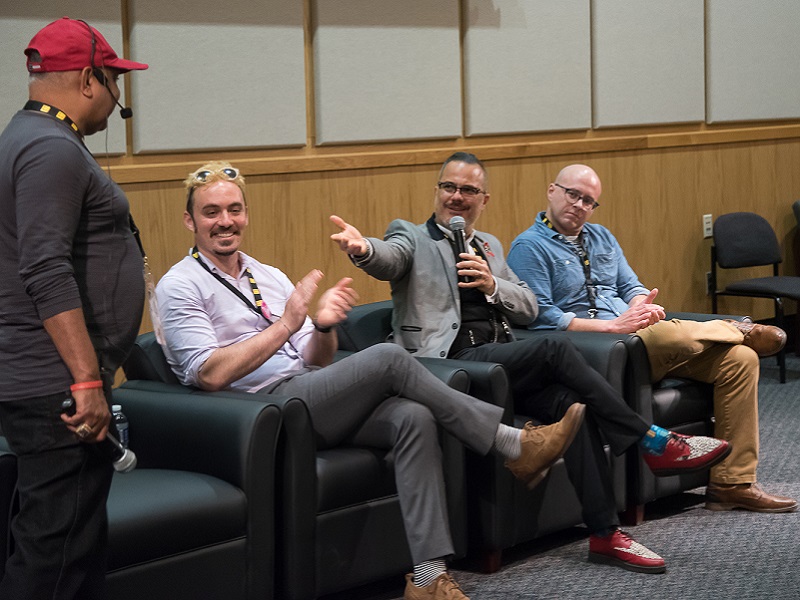
David Roston, Dr. Markalain Derby, and Jason Hartfield, along with moderator Dorian Alexander (standing) discuss HIV in the south.
On Saturday, the New Orleans-based film Living Positive + was shown. It follows three characters overcoming adversity after being diagnosed with HIV, demonstrating how those living with HIV can live the same quality and quantity of life as those without the infection. This short film was directed by David Roston, who served on the collaborating team for F-NO. Roston earned his master's of public health from Tulane in 2018 and currently works for the Tulane Prevention Research Center and hosts a weekly public health talk show on WHIV.
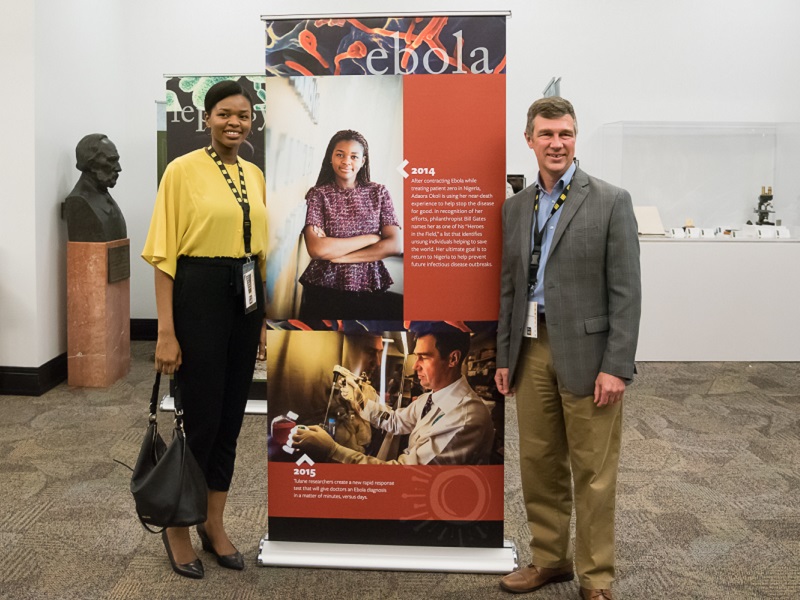
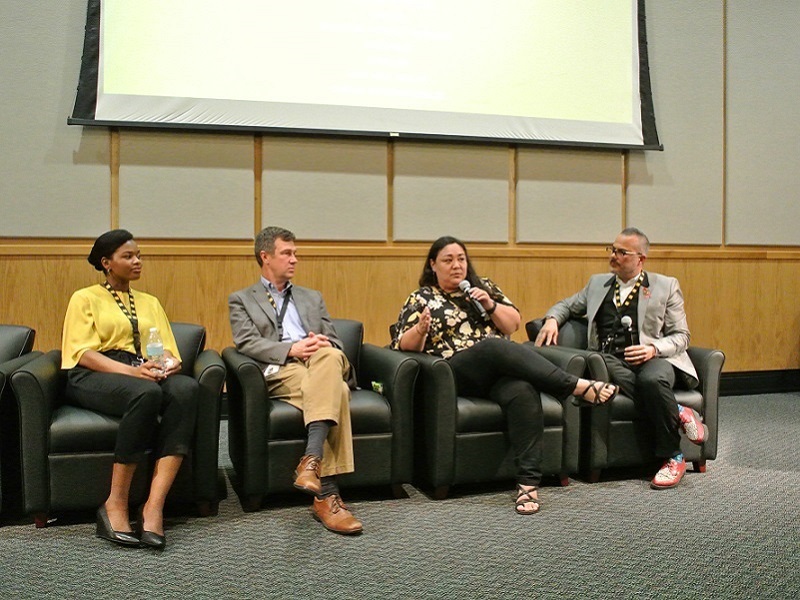
Above Dr. Adaora Okoli and Dr. John Schieffelin pose in front of an exhibit panel at "Outbreak" an exhibit in the Tidewater Building, which features Dr. Okoli. A panel discussion occurred after the showing of 93 Days discussing epidemics in West Africa with Dr. Adaora Okoli, Dr. John Schieffelin, Dr. Lina Moses, and Dr.Markalain Derby.
On Saturday night Dr. Adaora Okoli attended a screening of 93 Days. The film tells the story of the 2014 Ebola outbreak in Nigeria and features Okoli's near-death story of contracting Ebola while treating "patient zero" and being sent to an isolation center. Dr. Okoli earned her MPH from Tulane in 2018 and is currently pursuing a doctoral degree at SPHTM. Her ultimate goal is to return to Nigeria to help prevent future infectious disease outbreaks. In recognition of her efforts, philanthropist Bill Gates named her as one of his 2018 "Heroes in the Field," a list that identifies unsung individuals helping to save the world.
Many of Sunday's scheduled films were canceled due to some flooding caused by heavy rain. The cancellation impact Dean Thomas LaVeist’s feature documentary, The Skin You're In, which investigates the astonishing disparity between black and white health in America. It will be rescheduled at a later date.
Sunday's showing of Amá was able to go on at an alternate location. The documentary exposes the forced sterilization of thousands of Native American women by the United Stats government.
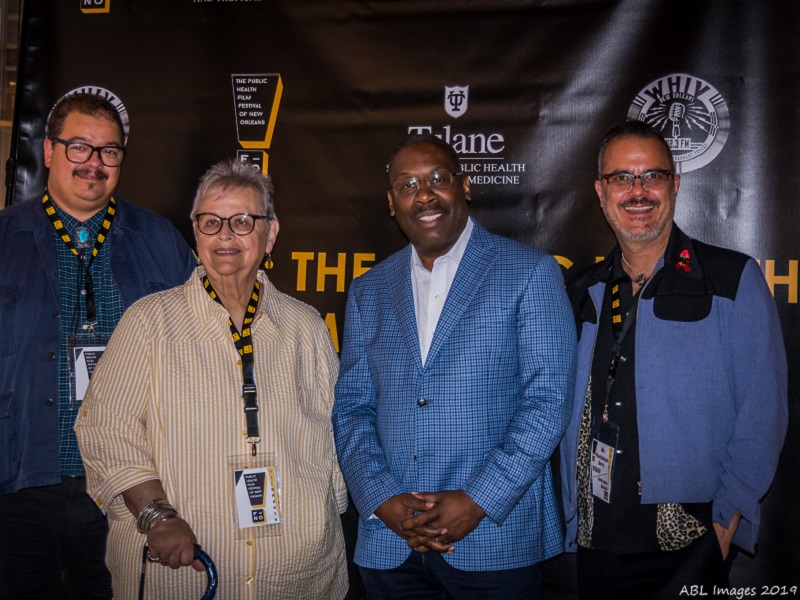
Dr. Jeffery Darensbourg, tribal council member of the Alligator Band at Atakapa-Ishak Nation of Southwest Louisiana and Southeast Texas, Charon Asetoyer, Native American women's health activist and CEO and founder of the Native American Community Board and the Native American Women's Health Education Resource Center, SPHTM Dean Thomas Laviest, and Dr.MarkAlain Derby, after the showing of the film Amá.
